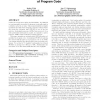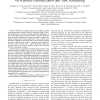328 search results - page 5 / 66 » Static performance prediction of skeletal parallel programs |
IEEEPACT
1998
IEEE
13 years 11 months ago
1998
IEEE
Hybrid branch predictors combine the predictions of multiple single-level or two-level branch predictors. The prediction-combining hardware -- the "meta-predictor" -may ...
IPPS
2005
IEEE
2005
IEEE
Building on a Framework: Using FG for More Flexibility and Improved Performance in Parallel Programs
14 years 29 days ago
We describe new features of FG that are designed to improve performance and extend the range of computations that fit into its framework. FG (short for Framework Generator) is a ...
MICRO
1993
IEEE
13 years 11 months ago
1993
IEEE
Compile-time code transformations which expose instruction-level parallelism (ILP) typically take into account the constraints imposed by all execution scenarios in the program. H...
DAC
2009
ACM
14 years 8 months ago
2009
ACM
Caches are notorious for their unpredictability. It is difficult or even impossible to predict if a memory access will result in a definite cache hit or miss. This unpredictabilit...
ISPASS
2009
IEEE
2009
IEEE
Machine learning based online performance prediction for runtime parallelization and task scheduling
14 years 2 months ago
—With the emerging many-core paradigm, parallel programming must extend beyond its traditional realm of scientific applications. Converting existing sequential applications as w...


